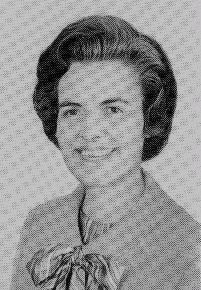Page 43
[Begin Tape 1, Side A]
Kasper: Well, this is Day 2 and I'd like to pick up and run with your career in journalism and really for most of today, if you will, see how much of that we can cover. And, of course, we have covered most of your life in a life historical—
Castleberry: School and marriage and—
Kasper: Sure. And all of that does intervene. It's not to say that as we cover your journalism career there aren't going to be lots of other things, family and personal and so forth that aren't going to intervene, but this is the day that I'd like to capture the material on your career. Where we left off on that score, is yesterday we talked a bit about your first job. You were an editorial assistant at the Petroleum Engineers Publishing Company. And then when you all moved and Curt went back to school, to Texas A&M, you were the first women's editor of the Texas A&M Battalion. So I'd like you to talk a little bit about that, but then let's get heavy into your—
Castleberry: Well, really, there's not a great deal to say about that. That went on for a little better than a year and it was something that I worked myself into because at the time, as I said yesterday, the A&M Daily Battalion was also the official voice of the city of College Station, so that made it interesting. And there were just a lot of things to be covered that were not being covered because the newspaper, of course, was being run by the boys who were students, and they were students first and didn't have time to cover all that material.
So, I really can't remember my first trip there, but I do remember that I pretty much shadowed—I would go by the Battalion office and then I started writing a column for them on the—the school was just running over with student wives and they had no voice whatsoever. So the first thing I did was talk them into letting me do a column on student wives and student wife activities. And from that it grew and finally they just hired me. They put me on the payroll, gave me a title, and also it was wonderful for them because I was there all of the time. I could keep regular office hours and nobody else could because they would run off to class. And that meant that I became the caretaker of all of the telephone calls that came in, the communication, that sort of thing and did almost all of the communicating.
Kasper: So you knew what was happening not only on campus but in town and everywhere.
Castleberry: Everywhere. Everywhere. And including, of course, the chancellor's office, and the board of directors, and everything that was going on. It was just a fun job. And during the time then that Curtis was in the Corps and getting ready when he graduated to go for advanced training for the military, we didn't know where we would be living because the Korean War was still going on. And the interesting thing was that we did not for one moment think that we would be doing anything except going back into the military. It was just a given because when you graduate with a second lieutenant's degree and you—
Kasper: You become almost a career officer.
Castleberry: You are a career officer until you choose otherwise. And although that was not Curt's first choice, as I said yesterday, he said, with him, at that point in his life, it was a matter of whether or not he would be able to support his family and that a foot soldier or a marine sergeant certainly didn't have this good an opportunity.
But when we graduated—also at that time, after we lost the baby, I was agitating to have another child. I was older than most women at my stage in life

